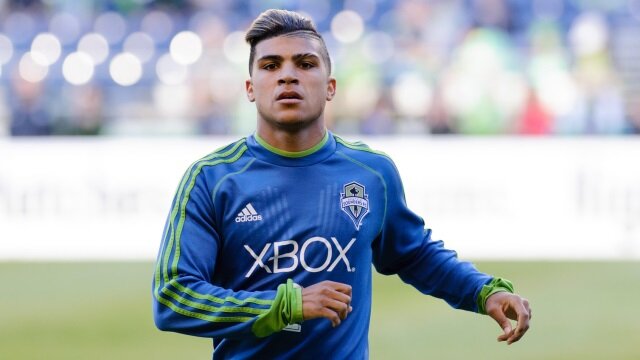U.S. Open Cup Semi-Final: Seattle Sounders v. Chicago Fire
 Last night I tuned-in online, via ussoccer.com, for the semi-finals of the Lamar Hunt U.S. Open Cup, apparently the oldest soccer tournament in the U.S. and the third longest-running soccer tournament in...the world? Really? Okay...
Last night I tuned-in online, via ussoccer.com, for the semi-finals of the Lamar Hunt U.S. Open Cup, apparently the oldest soccer tournament in the U.S. and the third longest-running soccer tournament in...the world? Really? Okay...Hosted and covered by ussoccer.com, the "coverage" of the game was quaintly bad: there seemed to be only two cameras (only two...are we spoiled or what?); a gantry camera positioned at an uncomfortably low angle to the field, and an on-field camera for replays. The one announcer in the booth, Ross Fletcher, had to basically entertain himself, as he had no one to bounce off of; and the little, home-made graphics looked like they were done by the local junior high A/V club. Still...it all added to the game's charm...
...a charm which quickly faded as the Seattle Sounders steam-rolled the basically ineffective Chicago Fire. As I understand it, Chicago are floundering in their conference; they're in eighth place out of 10, with a 5-4-13 record (thirteen tie-games?? Sheesh...), and a -5 goal differential. Far from the worst in the whole MLS but clearly the Fire aren't setting the league ablaze any time soon...
Last night it was as clear to me as it's ever been why and how a certain team can dominate another so completely. Even without Clint Dempsey (which was the interesting thing, Seattle's got incredible depth on their squad) they wore away Chicago relentlessly, starting with goals at 6' and 33' in the first half. After the break, in the 58' minute they put the last nail in the coffin; the three goals in five minutes that came at 79', 83' and 84' were just adding insult to injury. Incidentally, the last two, by Kenny Cooper, were probably the fastest two goals I've ever seen by the same guy.
Anyway...my observations: Chicago showed some decent ability to get the ball up the field and create chances; I'm thinking specifically of the connection between Grant Ward (M) and Quincy Amarikwa (F) which at one point seemed like it might produce a goal or two and keep Chicago in the game. Midfielder and one-namer Alex also demonstrated his ability to at least occasionally control the tempo of the game and open up space for forward runs, but...
...the simple fact is that Seattle allowed Chicago no space in the midfield. The difference between Chicago on the attack and Seattle on the attack was pretty stark. When Chicago go the ball, Seattle would start defending in Chicago's half. Conversely, Chicago -- perhaps a bit timid of Seattle's more potent offense -- hung back and gave Seattle all sorts of room to sort things out in the midfield; therefore, when Chicago did manage to get the ball, they were too far back to make a quick enough challenge and catch Seattle back on their heels. Turns out, they were right to be wary of Seattle's attack, but it seems now like a self-fulfilling prophesy; stay back because you fear their offense, and they use the extra room to get momentum going and stuff the ball into your onion bag six friggin times.
 |
| DeAndre Yedlin (IDK whether that's really him or his FIFA 2014 likeness. They make those video games so damned realistic these days....) |


Comments